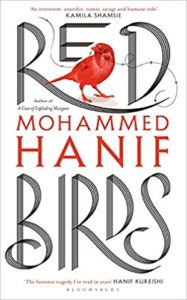Mohammed Hanif’s “Red Birds”
 Nihilistic resistance is the worst kind of enemy; it was all the rage, we were taught in our Cultural Sensitivity 101. Colonel Slatter had laid out the foundations: We used to have art for art’s sake; now we have war for the sake of war. No lands captured, no slaves taken, no mass rapes, fuck their oil wells, ignore their mineral deposits. You can outsource mass rape. War has been condensed to carpet-bombing followed by dry rations and craft classes for the refugees. People who had not left their little hamlets for centuries, goatherds who belived in nothing but grassy fields and folk music, women who had never walked beyond the village well, not they could all go and live in UN tents, eat exotic food donated by USAID and burp after drinking fizzy drinks.
Nihilistic resistance is the worst kind of enemy; it was all the rage, we were taught in our Cultural Sensitivity 101. Colonel Slatter had laid out the foundations: We used to have art for art’s sake; now we have war for the sake of war. No lands captured, no slaves taken, no mass rapes, fuck their oil wells, ignore their mineral deposits. You can outsource mass rape. War has been condensed to carpet-bombing followed by dry rations and craft classes for the refugees. People who had not left their little hamlets for centuries, goatherds who belived in nothing but grassy fields and folk music, women who had never walked beyond the village well, not they could all go and live in UN tents, eat exotic food donated by USAID and burp after drinking fizzy drinks.
Mohammed Hanif’s third novel Red Birds is a brilliant political satire using primarily three narrators — Momo, a teenager who dreams of becoming a millionaire after having read Fortune 500; Ellie, a US fighter pilot who ejected out of his burning plane in to the desert and Mutt, Momo’s dog, who has been anthropomorphised by the novelist. The three sections of the book are the three locations where the story is set — the desert, the camp and the hangar. These are in a geographical location that is never very clear where it exists but many readers will recognise it to be an amalgamation of many conflict zones around the world. For the first two sections of the book the women characters of Mother Dear and Lady Flowerbody are present and contribute to the conversations but it is reported speech. Mother Dear is Momo’s mother and absolutely furious with her husband for having taken away their elder son, Bro Ali. Father Dear introduces Lady Flowerbody as his co-worker. Lady Flowerbody is the new Coordinating Officer for the Families Rehabilitation Programme who “works with the families affected by raids and is conducting a survey on post-conflict conflict resolution strategies that involve histories and folklore”. Whereas Lady Flowerbody claims she is writing her “PhD thesis on the Teenage Muslim Mind, their hopes, their desires; it might come out as a book called The Children of the Desert“. It is only in the third section of the novel, “In the Hangar”, that the women characters speak and when they do it is powerfully and lucidly.
If the story can be encapsulated in a nutshell it would be about the family in the refugee camp whose elder son went off to the hangar but never returned. Dear Father is suspected by his family of having sold off his elder son. Dear Mother who is mostly confined to the kitchen cooking is given to ranting but she is mostly “off stage”. The male characters — her husband and son, later to be joined by the pilot and a nomad-turned-doctor — mostly hear her out with the husband being the most dismissive of her angry monologues particularly when he cannot understand her obsessiveness with the lack of salt and her inability to cook a decent meal. Ellie is a participant and a spectator to this, more like the chorus in a Greek tragedy, but he has his own concerns to worry about. Ellie worries about his wife and his job.
Former Pakistan Air Force pilot-turned-journalist Mohammed Hanif scathing political satire Red Birds is reminiscent of Catch-22 by Joseph Heller. Apparently cadet Hanif discovered Joseph Heller’s classic Catch-22 in the Air Force Academy library. In an interview with BBC journalist Razia Iqbal in 2014, Hanif said he loved Heller’s novel and read it “at least 22 times”. He said he found the book funny but their lives were not unfunny. Hanif adds that Heller certainly changed Hanif’s outlook on the world he was living in.
Red Birds is a fine novel. The deadpan style of writing reveals the absurd situations of war zones. The absurdity of the scenarios are funny too. But it is chilling to realise that these absurd moments are plausible in a conflict zone. Take for instance Father Dear carting piles and piles of files, the nomad-turned-doctor who is called in to treat Mutt, the teenager Momo who learns to drive and steers while sitting on a pile of cushions or Mother Dear who is worried about the lack of salt ( which is actually not unfunny for many, especially women, who have lived in conflict zones).
Red Birds is a sharply satirical novel that cannot be ignored. It is bound to be on the literary prize lists in the coming year. Perhaps even win a prize or two. Read it!
To buy on Amazon India:
7 November 2018

